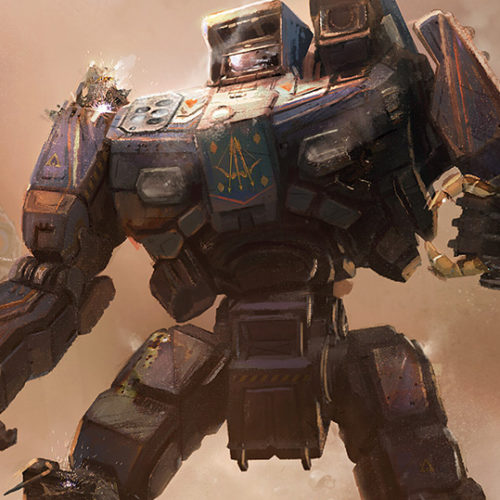Rise of the Robots.
Decades ago, BattleTech began life as a table top game. The MechWarrior series followed. Fast-forward a few generations and creator Jordan Weisman and developer Harebrained Schemes have now respawned this franchise as a turn-based strategy game. This BattleTech is set in 3025. The galaxy is consumed by numerous wars, fought by its various ruling factions. This is the intergalactic equivalent of endless proxy wars, where the noble houses conduct their wars via mechanised combatants known as battlemechs.
Star wars
The player begins by situating their character in this theatre of war by way of some initial customization options. Whilst this is effectively restricted to a relatively selective question and answer session, the player does get some input into their character’s background – the planet that they come from, what kind of ideals they hold and what impact certain events had on their life choices. The options in terms of home world choice are fairly diverse, ranging from liberal democracies, martial law, monarchies, and matriarchies. Players can also choose their character’s physical image and pronoun separately (‘he’, ‘she’ or ‘they’), which is a really nice touch.

MSRP: $39.99
Platforms: PC
From this assembly line I created the following: a character of noble birth who hails from the deep space periphery, I was exiled at 16 following an unexplained transgression. Out on my own, I decided to become a freelance pilot and jumped into the main campaign. BattleTech’s single player story is fairly compelling. The player’s character is thrust into the middle of a coup and then exiled (again), which kickstarts an extended quest to restore a rightful heir to power.
Whilst this tale might seem relatively typical, it’s brought to life by an infusion of lore that touches almost everything the player may care to investigate. This really gives a sense of depth to the historic context of BattleTech’s galaxy and the noble families it contains. The game also features some excellent art direction, which really contributes to the perspective that this is a fully realised universe in which the player can become immersed.
Roll the dice.
BattleTech embeds a couple of basic tutorial missions into the start of its campaign, which introduce the core elements of combat strategy to the player. Effectively the player controls four battlemechs, with combat taking place on a field of play which features varied topography and maps. There is no grid system to dictate movement in BattleTech’s combat, so players must think carefully about where their mechs are positioned. For example, terrain plays a central role in impacting engagement with the enemy, as does line of sight. Combat itself is turn-based and quite slow, but ultimately the depth makes it very rewarding.
Missions include standard fare such as search and destroy scenarios, retrieving items, rescuing people, stopping pirates, so on and so forth. However, essentially the intention behind each mission is to create the rules of engagement for battles with enemy mechs. The underlying strategy and mechanics on offer make these battles interesting and engaging affairs, with one notable side effect – BattleTech’s RNG is all over the place. Missions that should theoretically pose a challenge can often be completed with relative ease, whilst missions that are flagged as easy can throw up a wildly unpredictable challenge.

Further role-playing aspects can be found outside of the combat arena. In between missions, another side of BattleTech’s strategy presents itself: the life of a mercenary. This tasks the player with managing the finances and upgrades of their ship, managing fellow crewmembers and recruitment, and ensuring Mechs are well maintained and fit for battle. Mechs themselves come in a variety of shapes and sizes (the selection of which will, of course, impact combat strategy); and can be customised accordingly.
Over-encumbered.
Unfortunately, BattleTech does suffer from some overt performance issues. Loading times are excessively long, which is far from ideal given the overall pace of the game is already on the slow side. There are issues that impact framerates, graphically the game is far from stunning and the battlefield camera is often ridiculously misplaced when zoomed in. The game needs further optimization, and a lot of it.
Fortunately, none of these issues are game breaking. Whilst they cause a fair amount of frustration, BattleTech’s performance struggles aren’t so intrusive as to really detract from enjoying the game in terms of an overall experience. While there is no excuse for a title to be released in this state, it is encouraging to see that the game has received several updates since it officially launched.
The same can be said, in a way, about BattleTech’s story: I enjoyed it, and I think the composition of the game’s overall universe is excellent. However, as I advanced through the main campaign the character development felt increasingly unnatural. Examples of this crop up in certain instances when the player engages in dialogue with other characters. At times, specific origin options become available to select as an answer, depending on the player’s initial character creation choices. At first, I was intrigued to see how these would impact the direction of the narrative. Disappointingly, this never seemed to happen in any kind of substantial way – at least, insofar as I could determine.

Conclusion
BattleTech is a game that requires patience: it takes time to get to grips with the mechanics, it takes time to complete battles, and it takes time to simply load a battle. The performance issues which afflict this game are fairly significant, but not significant enough to be considered a deal-breaker.
There is quality here – the gameplay and strategy are genuinely sound, the campaign is worth the investment, and the universe is rich and compelling. This is a flawed title, but BattleTech’s nuanced tactical depth and engaging system of progression will ultimately sustain it over the long haul.
Review copy of game provided by publisher.
